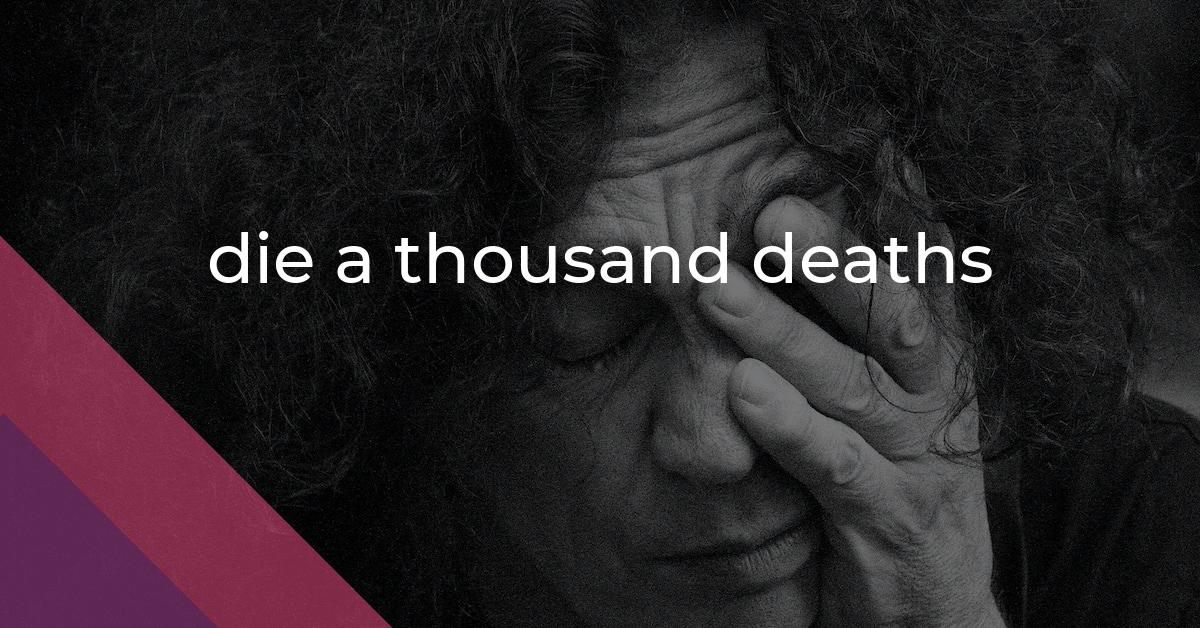die a thousand deaths: Idiom Meaning and Origin
What does ‘die a thousand deaths’ mean?
The idiom "die a thousand deaths" means to experience extreme anxiety or fear, often over a prolonged period, as if one were dying multiple times. It conveys a sense of intense emotional distress and vulnerability.

Idiom Explorer
The idiom "kiss of death" refers to an action or event that leads to certain failure or ruin. It implies that something or someone has a detrimental or fatal effect on a situation or outcome.
The idiom "kill me" is an informal expression used to convey extreme boredom, annoyance, or frustration. It is often used humorously to exaggerate a negative feeling or situation.
The idiom "kick the bucket" means to die or to pass away. It is a metaphorical expression that originated from the idea of someone accidentally kicking a bucket while they are hanging from a noose, resulting in their death.
The idiom "hill to die on" refers to a strongly held belief or principle that a person is unwilling to compromise on, even if it means facing serious consequences or opposition.
The idiom "hell to pay" means to face severe consequences or trouble for one's actions or decisions.
The idiom "go through hell" means to experience extreme hardship, suffering, or a difficult situation, often for an extended period of time.
The idiom "go down in flames" means to suffer a significant and public failure or defeat. It is often used to describe a situation where all efforts or plans end in disaster or are unsuccessful.
The idiom "for one's life" means doing something urgently or desperately to avoid harm, danger, or death.
The idiom "fight for one's life" means to struggle with all one's effort and determination to survive or overcome a life-threatening situation or serious challenge.
The idiom "eat one's gun" is an extreme figurative expression that refers to the act of committing suicide by shooting oneself with a gun. It signifies utter desperation or hopelessness in a person's life.
Eternal Torment
The idiom "die a thousand deaths" is widely used in the English language and is rooted in Greek mythology. The myth of Tantalus depicts a mortal who was punished in the underworld, constantly tormented by thirst and hunger with water and fruit always just out of reach.
Today, "to die a thousand deaths" represents enduring extreme suffering or mental anguish. It metaphorically describes situations of great emotional distress or inner turmoil. The idiom conveys a sense of being overwhelmed by anguish and enduring an interminable amount of suffering.
In popular usage, "die a thousand deaths" emphasizes the intensity of an emotional experience or describes situations where one is repeatedly subjected to pain, embarrassment, or humiliation. It can represent going through a multitude of difficult experiences, whether real or imagined.
The idiom is not limited to any specific context but is applicable across various domains. It can be used in personal conversations, literature, movies, and journalism to depict someone's emotional distress or the gravity of a challenging situation.
What makes this idiom intriguing is its ability to capture the universality of human emotions. Regardless of specific circumstances, people can relate to enduring emotional pain. It highlights the shared human experience of suffering and the potential for empathy between individuals.
Overall, "die a thousand deaths" serves as a powerful linguistic tool for expressing intense emotional suffering. It draws from ancient Greek mythology to convey enduring agony. Its usage in modern-day English signifies the depth of emotional distress one can experience. This idiom reminds us of the complex nature of human emotions, the universality of suffering, and the potential for connection through shared experiences.
The idiom "die" is often used to describe the act of ceasing to live or exist. It carries a finality and permanence, representing the end of life. When used in the context of "die a thousand deaths," it intensifies the idea of enduring suffering as if experiencing multiple deaths, highlighting the immense impact of emotional distress.
The phrase "bat a thousand" is another idiom used to describe exceptional or perfect performance. It originates from baseball, where batting 1.000 means hitting the ball every time one is up to bat. When contrasted with "die a thousand deaths," which represents intense suffering, "bat a thousand" symbolizes the opposite end of the spectrum - achieving perfection or experiencing continuous success.
When considering the relationship between these idioms, it becomes apparent that they represent opposing extremes. "Die a thousand deaths" conveys immense suffering, while "bat a thousand" represents flawless success. These idioms capture the range of human experiences, from enduring hardship to achieving excellence.
Example usage
Examples of how the idiom "die a thousand deaths" can be used in a sentence include:
1. When I saw the mistake in my presentation, I died a thousand deaths right there.
2. Waiting for the test results, I felt like I was dying a thousand deaths.
3. As an actor, I have to face rejection constantly, and each time I don't get a role, it feels like I've died a thousand deaths.
More "Metaphorical" idioms



